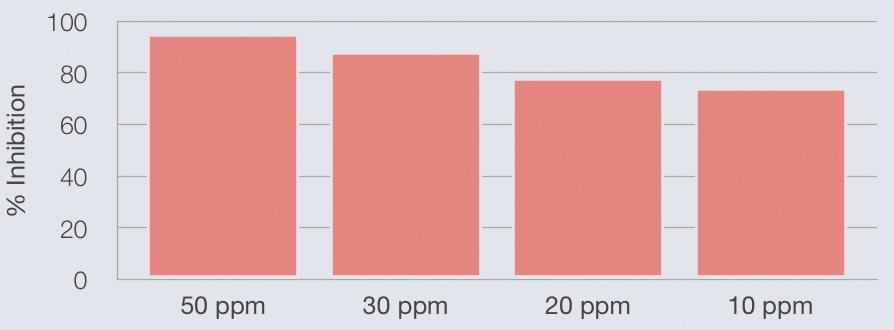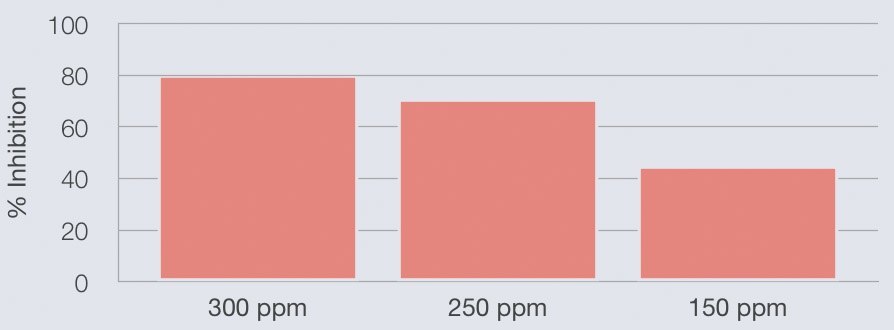Research evidence
Viqua® protects the skin — right down to its deepest layers
Collagen and Elastin are macro-proteins which form the structure of the skin’s deeper layers (see picture to the right). They’re also responsible for the skin’s overall firmness and elasticity.

Collagenase and Elastase are the enzymes which prevent the renewal of these deeper layers, and so cause wrinkles to appear.
In in vitro testing, Viqua® was shown to be a potent inhibitor of both Collagenase and Elastase at low concentration, and so helped to significantly reduce the symptoms of ageing associated with them.
- Elastase inhibition
- Collagenase Inhibition


Protecting blood micro-circulation
After four weeks of Viqua® treatment, the permeability of the skin’s blood vessels was significantly reduced and blood circulation increased.

Effectiveness inside cells
Viqua® scavenges free radicals from inside the mitochondria
A key in vitro study has shown Viqua® to be intelligently used by skin cells to cleanse free radicals inside their mitochondria, and so to restore healthy metabolism.
Human skin cells, adipocytes, were grown in a medium which also contained Viqua®, whose molecules were tainted with a fluorescent red marker to make them clearly visible under a microscope.

The resultant electron microscopy showed Viqua® to have successfully penetrated the adipocytes and to have localized itself within the mitochondria.
Further experiments subsequently showed Viqua® to be actively using the adipocytes’ mitochondria as a place to scavenge for free radicals.
- Capacity of Viqua® to reduce oxidation inside the cell

Clinical results
The efficacy of Viqua® was clinically assessed in a trial involving thirty volunteers over a four-week period against a placebo. At the start of the trial, half of the participants chose Viqua® capsules, the other half placebo pills — no-one knowing which contained which.
At the end of the trial, the results gave scientific evidence to demonstrate a significant improvement of the Viqua®-taking volunteers’ skins:
- Skin hydration rose significantly (+40%), whereas the placebo group saw a decrease (–0.3%).
- The water content of the skin’s upper layers particularly improved with Viqua® (+51%).
- Skin smoothness improved (+27%) — a significant decrease in depth of fine lines and wrinkles was recorded (volume: –26%).
- Blood vessel remodelling suggested significant inhibition of inflammation processes.
- Skin tone became generally brighter, and dark spot/blemish colour attenuated.
- Moisturizing
- Skin smoothness
- Inflammation
- Whitening




Volunteer self-assessment results mirrored the product efficacy results proven above. The Viqua® subjects also expressed a greater overall satisfaction score for the treatment vs. those given the placebo.
Scientific references
Pomegranate: the most powerful weapon against ageing
Calling pomegranates the super "super fruit’’ isn’t just hype: there are extensive clinical studies to back up the claim:

Anti-oxidant activity of Pomegranate
- Pomegranate ingredients which mimic the Polyphenol ratio of the fruit; potent synergistic effects have been observed in ’natural spectrum’ extracts — particularly pomegranate concentrate normalised to Punicalagins. J Nutr Biochemistry 2005 (16) 360—367.
- Intervention of anti–oxidant system function of aged rats by giving fruit juices with different anti-oxidant capacities. Xu J, Guo CJ, Yang JJ, Wei JY, Li YF, Pang W, Jiang YG, Cheng S. Dept of Nutrition, Institute of Hygiene & Environmental Medicine, Acedemy of Military Medical Sciences, Tianjin, China.
- Determination of Phenolic compounds in pomegranate juice by HPLC. Artik N, Ceremroglu B, Murakami H, Mori T. Fruit Process. 1998;8:492–499.
- Anti-oxidant activity of pomegranate juice and its relationship with Phenolic composition and processing. Gil MI, Tomas-Barberan FA, Hess-Pierce B, Holcroft DM, Kader AA.J Agri Food Chem. 2000;48:4581-4589.
- Quantitative determination of Polyphenolic content of pomegranate peel. Ben Nasar N, Ayed M. Z Lebensm Unters Frosch. 1996;203:374–378.
- Pharmacological and therapeutic properties of pomegranate. Lansky E, Schubert S, Neeman I: Symposium International Sobre El Granado (First international Symposium on the Pomegranate), Orihuela, Spain, October 1998.
- Beneficial effects of pomegranate juice on oxidation-sensitive genes and endothelial nitric oxide synthase activity at sites of perturbed shear stress. de Nigris F. et al. Proc Natl Acad Sci. USA. 2005 Mar 29;102(13):4896-901. Epub 2005 Mar 21.
- Antioxidant activity of pomegranate juice and its relationship with phenolic composition and processing. Gil MI. et al. J Agric Food Chem. 2000 Oct;48(10):4581-9.
- Antioxidant activity of selected foodstuffs. Kelawala NS. et al. Int J Food Sci Nutr. 2004 Sep;55(6): 511 6.
Cardio-vascular disease prevention
- Pomegranate juice consumption reduces oxidative stress, atherogenic modifications to LDL and platelet aggregation: studies in humans and in atherosclerotic Apolipoprotein E–deficient mice. Aviram M, Dronfeld L, Rosenblat M, et al. Am J Clin Nutr. 2000;71:1062—1076.
- Pomegranate juice flavonoids inhibit low–density lipoprotein oxidation and cardiovascular disease: studies in atherosclerotic mice and in humans. Aviram M, Dornefeld L, Kaplan M, Gaitini D, Nitecki S, Hofman A, Rosenblat M, Volkova N, Presser D, Attias J, Hayek T, Fuhrman B. Lipid Research Laboratory, Technion Faculty of Medicine, Israel.
- Pomegranate juice supplementation to atherosclerotic mice reduces macrophage lipid peroxidation, cellular cholesterol accumulation and development of atherosclerosis. Marielle Kaplan, Tony Hayek, Ayelet Raz, Raymond Coleman, Leslie Dornfeld, Jacob Vaya and Michael Aviram. Lipid research laboratory, the Department of anatomy and cell biology, Bruce Rappaport Faculty of Medecine, Technion, Rambam Medical Center, Haifa, Israel.
- Pomegranate juice consumption reduces oxidative stress, atherogenic modifications to LDL, and platelet aggregation: studies in humans and in atherosclerotic Apolipoprotein E-deficient mice. Aviram M, et al. Am J Clin Nutr 2000; 71:1062-76.
- Pomegranate juice flavonoids inhibit low-density lipoprotein oxidation and cardiovascular diseases : studies in atherosclerotic mice and in humans. Aviram M. et al. Drugs Exp Clin Res. 2002;28(2-3):49-62.
- Pomegranate juice consumption for 3 years by patients with carotid artery stenosis reduces common carotid intima-media thickness, blood pressure and LDL oxidation. Aviram M. et al. Clin Nutr. 2004 Jun;23(3):423-33
- Effects of flavonoid-rich beverages on prostacyclin synthesis in humans and human aortic endothelial cells: association with ex vivo platelet function. Polagruto JA. et al. J Med Food. 2003 Winter;6(4):301-8
Cancer prevention
- Differentiation-promoting activity of pomegranate (punica granatum) fruit extracts in HL-60 human promyelocytic leukemia cells. Apr 2004, Vol. 7, No. 1: 13-18.
- Chemopreventive and adjuvant therapeutic potential of pomegranate (punica granatum) for human breast cancer. Kim ND, et al. Breast Cancer Res Treat 2002; 71:203-17.
- Anthocyanin- and hydrolysable tannin-rich pomegranate fruit extract modulates MAPK and NF-kappaB pathways and inhibits skin tumorigenesis in CD-1 mice. Afaq F. et al. Int J Cancer 2005 Jan 20;113(3):423-33.
- Differenciation-promoting activity of pomegranate (Punica granatum) fruit extracts in HL-60 human promyelocytic leukaemia cells. Kawaii S. et al. J Med Food. 2004 Spring;7(1):13-8.
- Pomegranate (Punica granatum) pure chemicals show possible synergistic inhibition of human PC-3 prostate cancer cell invasion across Matrigel. Lansky EP. et al. Invest New Drugs. 2005 Aug;23(4):379.
- In vitro antiproliferative, apoptotic and antioxidant activities of punicalagin, ellagic acid and a total pomegranate tannin extract are enhanced in combination with other polyphenols as found in pomegranate juice. Seeram NP. Et al. J Nutr Biochem. 2005 Jun;16(6):360-7.
Bioavailability
- Bioavailability of ellagic acid in human plasma after consumption of ellagitannins from pomegranate (Punica granatum L.) juice. Seeram NP. Et al. Clin Chim Acta. 2004 Oct;348(1-2):63-8.
- In vitro gastrointestinal digestion study of pomegranate juice phenolic compounds, anthocyanins, and vitaminC. Perez-Vicente A. et al., J Agric Food Chem. 2002 Apr 10;50(8):2308-12.
Anti-microbial action
- Punica granatum (Pomegranate) juice provides an HIV-1 entry inhibitor and candidate topical microbicide. Neurath AR. et al. BMC Infect Dis. 2004 Oct 14;4:41.
Wound healing
- Study on wound healing activity of Punica granatum peel. Murphy KN. et al., J Med Food. 2004 Summer;7(2):256-9.
Fight gastric ulcer
- The inhibition of astric mucosal injury by Punica granatum L. (pomegranate) methanolic extract. Ajaikumar KB. Et al. J Ethnopharmacol. 2005 Jan 4;96(1-2):171-6.
Neuroprotective
- Maternal dietary supplementation with pomegranate juice is neuroprotective in an animal model of neonatal hypoxic-ischemic brain injury. Loren DJ. et al. Pediatr. Res. 2005 Jun;57(6):858-64. Epub 2005 Mar.
Erectile dysfunction action
- Oxidative stress in arteriogenic erectile dysfunction: prophylactic role of antioxidants. Azadzoi KM. et al. J Urol. 2005 Jul;174(1):386-93.
Safety
- Repeated oral administration of high doses of the pomegranate ellagitannin punicalagin to rats for 37 days is not toxic. Cerda B. et al. J Agric Food Chem. 2003 May 21;51(11):3493-501.
Skin whitening effect
- Inhibitory effect of an Ellagic Acid-rich pomegranate extract on Tyrosinase activity and ultraviolet-induced pigmentation. Yoshimura M, Watanabe Y, Kasai K, Yamakoshi J, Koga T. Research and Development Division, Kikkoman Corporation.
Skin anti-ageing effect
- Pomegranate as a cosmeceutical source: pomegranate fractions promote proliferation and procollagen synthesis and inhibit matrix metalloproteinase-1 production in human skin cells. Journal of Ethnopharmacology 103: 311-318, 2006.
Copyright © 2015 Axialys Innovations
